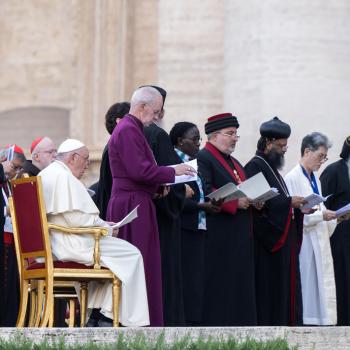
Scripture, the central book of the Christian faith, contains revelation, even though it was written down by human authors. Their humanity did not impede God’s work in and through them, even though their understanding of what they wrote was imperfect. For it is clear they had their own particular understandings of what they wrote, understandings which differed from the way Scripture would later be interpreted. This is because God inspired them and, through that inspiration, helped them to write in such a way that their words would be infused with meanings beyond what they knew or intended (similar to the way grace is said to perfect nature).
The transcendent nature of the truth explains why limited intellects cannot and will not comprehend it. Nonetheless, the truth can reveal itself to us in forms which we can apprehend, and this is what we have with revelation. Revelation is able to do this because it points to the truth which lies beyond itself, the truth from whence it came. We are granted some element of that truth through revelation, that truth which we can apprehend, but we must remember that because of this the fullness of the truth lies beyond what has been revealed. Therefore, revelation must be understood as aimed at us and our limited capabilities; God knows what we can understand and so works to reveal to us in a way which we can attain our greatest understanding of the truth (if we properly work with what has been revealed, trying to understand it and all the meanings which can come from it). What we can be said to be true because it comes from and is derivative of the truth. Thus, our knowledge of truth is itself derivative in value, as S.L. Frank explained:
Truth is the truth of knowledge only derivatively, whether this be the truth of objective knowledge as the correspondence of our representations and thoughts with reality itself, or truth as revealed as presence, as the self-disclosure, the self-revelation of reality. In itself, truth is Truth, the self-illuminating light. [1]
What we receive through revelation is a conventional presentation of the truth. As long as do not treat revelation as the absolute truth but rather as a pointer to it, revelation does us much good. But if we misapprehend it and confuse the convention we receive as being the absolute truth in and of itself, we use what we have received to limit the truth and so end up denying the truth itself. Thus, God works with us to reveal to us what we can apprehend, but as St. Isaac of Syria warned us, we must not believe that we ever comprehend the fullness of the truth with our apprehensions:
And this we ought to know: that revelation and the working [thereof] are one thing, and truth and knowledge another, in that revelation is not the exactness of truth itself, but shows certain indications and sings in proportion to human capacity; nor are the workings and wonders of revelations said to be truth and knowledge; they are called the overshadowing of the [divine] working. For there is no way to learn from them anything about the foreknowledge of God, or the incomprehensibility of His nature, or the distinctions in His properties, or insights into the mysteries of His will for mankind, or the other things that are to be obtained by sound knowledge of Him. Therefore the mysteries that the understanding apprehends through insight into the divine nature are one thing, and the [divine] working that overshadows the mind for a time is another.[2]
Revelation can come to us in many forms. We can find God working in and revealing truth to us through all creation, so that in and through all things, we learn something about God and see God reflected in them. This serves as the foundation for “natural revelation,” where nature itself can be said to be a book about God. Natural revelation is important and invaluable, but it is extremely limited as to what it can reveal. Christians have Scripture as their central form of revelation; it gives the faithful a common foundation by which they can come together and discuss their faith. Nonetheless, Scripture itself is only a witness to the revelation given to us in and through the incarnation, in and through the person of Jesus Christ. Thus, the incarnation itself is revelatory, which is why Jesus said someone could encounter the Father through him. Finally, we can engage God in our spiritual life. When we do so, we can be shown great wonders and have our mind lifted up and transcend itself as we receive and unite with the uncreated energies of God.
We must recognize the limitations of revelation. We must use what is intended for us as a good which will help point us to the greater, transcendent truth into something which would impede our engagement with the fullness of the truth itself. Moreover, we should make sure we do not unduly attach ourselves to the form in which the truth is revealed to us, confusing the presentation with the truth itself, for if we make this confusion, we will attach ourselves to the letter employed instead of the meaning intended by it, and this will only lead to an impoverished spiritual life. We must realize that all our apprehensions, no matter how great they are, and they should always become greater as we realize more and more grace in our lives, are conventions, no matter how crude or subtle those conventions prove to be. As conventions, they can be said to be true, if we realize they are mere conventions pointing to the greater truth, but as soon as we absolutize those convention, they become cut off from the fullness of the truth. When this happens, we must deconstruct them, find out how and why we turned such conventions into absolutes, and seek the absolute which lies beyond them once again. Then, once we have done so, we can once again turn to those revelations, learn from them, and find ourselves enlightened by them, as God intended us to be.
[1] S. L. Frank, The Unknowable: An Ontological Introduction To The Philosophy of Religion. Trans. Boris Jakim (Brooklyn, NY: Angelico Press, 2020), 203.
[2] Saint Isaac the Syrian, The Ascetical Homilies of Saint Isaac the Syrian. Trans. Monks of the Holy Transfiguration Monastery. Rev. 2nd ed (Boston, MA: Holy Transfiguration Monastery, 2011), 544 [Appendix A Homily V].
Stay in touch! Like A Little Bit of Nothing on Facebook.
If you liked what you read, please consider sharing it with your friends and family!











